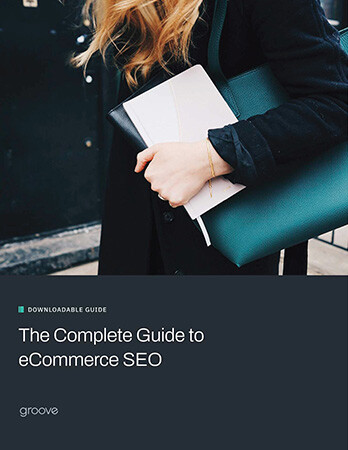“Domain Authority” Meaning
Domain authority, a metric developed by Moz, predicts how likely a website is to rank highly on search engine results pages (SERPs). It assigns scores ranging from one to 100, with higher numbers indicating a stronger ability to rank well. Moz calculates domain authority using factors such as:
Factors Affecting Domain Authority
- Quality signals, like spam scores
- The total number of backlinks
- Root domains of inbound links
While website authority is not a ranking factor used by Google, it provides a helpful benchmark when you assess your site’s SEO health. For a more accurate understanding of what Google prioritizes, explore Google Core Web Vitals, which focus on page speed, interactivity, and visual stability.
Why Does Domain Authority Matter for eCommerce?
For eCommerce brands, domain authority plays a significant role in driving the organic visibility of product pages, category pages, and blog content. A high domain authority score signals:
Benefits of High Domain Authority
- Greater trust: Customers and search engines perceive high-authority sites as more credible.
- Improved rankings: Strong domain authority can lead to better placement on SERPs, enhancing discoverability.
- Stronger brand presence: It contributes to building a recognizable and authoritative online brand.
For example, consider an eCommerce apparel store that competes for high rankings under keywords like “summer dresses.” High domain authority helps the brand outperform competitors on SERPs, driving traffic and conversions.
How to Improve eCommerce Domain Authority
To boost your domain authority and web presence strength, focus on these proven strategies:
Conduct a Competitive Audit
Start by analyzing your competitors. Tools like Ahrefs, Moz Pro, and SEMrush can help you identify who’s ranking highly for your target keywords. When conducting a competitive audit:
Steps to Analyze Competitors
- Focus on competitors with similar domain authority scores and audience sizes.
- Explore niche-specific rivals, such as direct-to-consumer brands or wholesale eCommerce players.
- Use tools like Moz’s "Keyword Explorer" to uncover shared keywords and backlink opportunities.
Audit Your Link Profile
A healthy backlink profile is crucial for building website authority. Backlinks from high-quality, authoritative sites are particularly valuable. Here’s how to optimize:
Tips for Optimizing Backlinks
- Use tools like SEMrush Backlink Checker or Moz Link Explorer to evaluate your links.
- Remove low-quality links that could harm your domain authority score.
- Prioritize diversity in backlink sources, targeting industry blogs, marketplaces, and reputable directories.
High-authority backlinks from eCommerce-related domains, like industry publications or well-known platforms, carry more weight.
Create Engaging Content
Creating high-quality content is key to earning backlinks. Successful eCommerce brands prioritize:
Types of Content That Attract eCommerce Backlinks
- Long-form content, like how-to guides and in-depth product comparisons
- Multimedia assets, such as infographics, videos, and interactive product pages
- Blog posts addressing customer pain points and industry trends
For instance, an electronics store might publish a detailed buyer’s guide that compares the latest notebook computers. This could attract backlinks from tech blogs.

Check the Status of Your Top Pages
Ensure that your most important pages are accessible and error-free. Broken links or inaccessible pages could harm your SEO and domain authority.
Best Practices for Page Optimization
- Use tools like Screaming Frog or Google Search Console to identify and fix 404 errors.
- Optimize anchor text for internal and external links to maximize relevance and SEO benefits.
- Redirect broken links to relevant active pages.
Earn High-Quality Links
Building quality backlinks takes effort, but it’s worth the investment.
Strategies for Earning Links
- Implement the skyscraper technique: Create better, more comprehensive content than your competitors and reach out to sites that link to their pages.
- Develop outreach campaigns that use email templates to request backlinks.
- Leverage content syndication by publishing guest posts on relevant industry platforms.
Common Mistakes to Avoid
When working to improve your domain authority, avoiding missteps is just as important as implementing best practices. Misguided efforts can waste resources, harm your website’s reputation, or even result in search engine penalties. Here are some common errors and how to steer clear of them:
Focusing on Quantity Over Quality
While it may be tempting to accumulate as many backlinks as possible, focusing solely on quantity can backfire. A handful of backlinks from high-authority, reputable sites carry far more weight than hundreds from low-quality or spammy websites.
Why This Is a Problem
- Low-quality backlinks can be flagged as spam, harming your domain authority score.
- Search engines like Google value relevance and trustworthiness over sheer numbers.
How to Avoid It
- Prioritize earning links from credible sources, such as industry blogs, authoritative publications, and well-known eCommerce platforms.
- Regularly audit your backlink profile using tools like SEMrush or Moz to identify and disavow harmful links.
Neglecting Mobile Optimization
Mobile users make up a significant portion of online shoppers, yet many eCommerce sites overlook mobile performance. Poor mobile optimization can have negative effects on bounce rates, rankings, and the user experience—all of which impact website authority.
Why This Is a Problem
- Google uses mobile-first indexing, meaning that it primarily evaluates the mobile version of your site when determining rankings.
- A poorly optimized mobile site can result in higher bounce rates; people will quickly leave your website instead of exploring it.
How to Avoid It
- Ensure your site has a responsive design that seamlessly adapts to different devices.
- Test your site’s performance using mobile devices and tools like PageSpeed Insights.
- Optimize mobile navigation and loading speeds to create a smooth user experience.
Relying on Spammy Link-Building Tactics
Unethical link-building methods, such as purchasing backlinks or participating in link farms, may seem like a shortcut to improving your domain authority. However, these tactics often lead to severe penalties from search engines, including significant drops in rankings.
Why This Is a Problem
- Google’s algorithms, such as Penguin, are designed to identify and penalize manipulative link schemes.
- Spammy backlinks diminish your site’s credibility and can permanently harm your reputation.
How to Avoid It
- Gain high-quality organic backlinks by creating content that naturally attracts links, such as comprehensive guides, infographics, or expert opinions.
- Use outreach campaigns to connect with industry influencers and reputable sites for collaboration.
- Focus on earning editorial backlinks, where your site is mentioned naturally within relevant, high-quality content.
Ignoring Technical SEO
Technical SEO is the foundation of a strong web presence, yet many eCommerce brands neglect it in favor of content or backlinks. Without a technically sound website, your domain authority will suffer, regardless of other efforts.
Why This Is a Problem
- Issues such as broken links, slow loading speeds, or duplicate content can discourage users and search engine crawlers.
- Search engines prioritize well-structured, error-free sites in their rankings.
How to Avoid It
- To identify and resolve issues, conduct regular technical SEO audits using tools like Screaming Frog or Sitebulb.
- Ensure your site is free of 404 errors, duplicate pages, and broken internal links.
- Optimize your site’s XML sitemap and robots.txt file to ensure smooth crawling and indexing.
Overlooking the User Experience (UX)
When a site is difficult to navigate or frustrating to use, it can deter visitors. This increases bounce rates and lowers engagement. A poor user experience signals to search engines that your site is not providing value, negatively affecting your domain authority.
Why This Is a Problem
- A poor UX reduces the likelihood of gaining backlinks and harms your backlink profile.
- Low engagement metrics like time on site or pages per session may signal that you have low-quality content.
How to Avoid It
- Focus on intuitive site design, clear navigation, and easy access to important information like product categories and contact details.
- Use analytics tools to monitor user behavior and make improvements based on data.
- Include multimedia content, like videos or interactive elements, to enhance engagement.
Failing to Follow the Latest SEO Best Practices
Search engine algorithms are constantly evolving. What worked a few years ago may no longer be effective—or could even be detrimental. Falling behind on current SEO practices can leave your efforts outdated and ineffective.
Why This Is a Problem
- SEO trends, such as Google’s focus on Core Web Vitals, have a direct impact on rankings and domain authority.
- Outdated strategies, like keyword stuffing or irrelevant backlinks, can hurt your website’s performance.
How to Avoid It
- Stay informed by following industry blogs from Moz, Search Engine Journal, and Groove Commerce.
- Attend webinars and SEO conferences to keep up with emerging trends.
- Regularly revisit your strategy to ensure it aligns with current best practices.
By avoiding these common mistakes and focusing on sustainable, ethical strategies, your eCommerce site can steadily improve its domain authority and overall SEO performance.
Emerging Trends Impacting Domain Authority
Stay ahead by adapting to these trends:
Trends to Watch
- AI-Generated Content: Leverage AI tools for scalable content creation but ensure originality and relevance to avoid penalties.
- Brand Signals: Mentions of your brand on authoritative sites, even without direct backlinks, contribute to authority and visibility.
- Interactive Content: Quizzes, calculators, and AR features enhance engagement and attract eCommerce backlinks.
Conclusion
eCommerce domain authority is a valuable metric to use when improving your website’s organic performance and trustworthiness. By following these actionable strategies—auditing competitors, refining backlinks, creating engaging content, and addressing technical SEO—you can boost your domain authority score while strengthening your eCommerce web presence.
Groove Commerce has successfully helped clients achieve these goals. For instance, our SEO and content marketing services made it possible for Cutter & Buck to boost yearly revenue by 49 percent. Read the case study for more details.
If you’re ready to take your eCommerce SEO strategy to the next level, consult with our experts. See how we could help your company achieve its goals by exploring our marketing services for online stores that use BigCommerce, Shopify, and other platforms. We can also perform a free website audit to reveal the best ways to improve your eCommerce store for better results.

PDF Download
The Complete Guide to eCommerce SEO:
Everything You Must Know
Explore tags:
About the author
Subscribe to the Groove Newsletter
Get the latest updates and insights straight to your inbox








